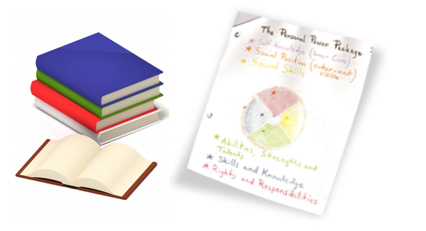- AFFILIATED TO CBSE : AFFILIATION NO 1930274
- |
- CONNECT
Quick Links
Photo Gallery
Study Skills
STUDY SKILLS
HOW TO MAKE A STUDY PLAN

For most students, the most difficult part of any exam is the actual studying. Typically, there is so much material to study that students begin to procrastinate, putting off studying until the night before. After a late-night cram session, students arrive at the exam tired and feeling dazed by the sheer amount of information they’ve tried to absorb. The easiest way to study for an exam, and avoid the cram sessions, is to make a study plan.
Group or solo? – The first step to making a study plan is to decide whether you want to study alone or in a group. When planning study times and organizing study sessions for a group, the needs and schedules of the group are a factor. As a result, you must decide whether you will be studying with a group before continuing with making a study plan.
Time – There are two time elements that are crucial to an effective study plan. The first time element to consider is the amount of time you have until the exam, while the second is the amount of time during the day that you can set aside for studying. Try to study for at least two hours per day for major exams, like entrance exams, and at least thirty minutes per day for lecture exams. If you are limited on the amount of time until the exam, such as one week or less, then you will need to increase your daily study time. Set up a schedule with clearly marked study times for each day.

Content – The content to be studied depends on the type of exam. For placement exams, entrance exams, licensure exams, there are no and specific textbooks or prior lecture notes. There are, however, commercially available review guides, and textbooks and lecture notes from past classes often contain a great deal of material that will help with the exam. By looking at the content areas of the test, you can determine what readily available material to study. For course-based exams, textbooks and lecture notes are both ideal study content. Break the content into chunks, and then assign specific chunks to the study times that you have listed on your schedule.
Chronological – Assign chunks of material to study times in chronological order. In other words, study the material in the order that it was presented. Remember to allot more time for studying the most important information.
Critical first – Assign study times so the most critical method is covered first, and then work down to the least important information. Allow more time for covering the most critical information. If you are having trouble with the most important information, re-assign time from the least important information.
THE STUDYING PROCESS
Once you have set up study times and assigned material to them, it is time to study. When reading textbooks, take notes on the information. With lecture notes, write notes in the margin. Use a highlighter. The idea is to make key information readily available for review. In addition, making notes and looking up ideas to supplement notes reinforces the material in your mind. Quiz yourself as you finish each area you are studying to determine what you still need to review.
Study plans are as unique as the person making them. The most effective study plan will take into account your schedule, the times each day when you are able to study without interruption, and the amount of material that needs to be reviewed. By spreading out the study times and breaking up the information, you make it easier for to absorb and retain the necessary material before the exam.

THE POWER OF STUDY GROUPS

Two Heads Are Better Than One
Have you ever noticed that when you explain something you've learned in class to a friend, you begin to understand it better yourself? This happens because when you explain, or teach, an idea, you need to actively think it through. And by thinking more deeply about what you've learned and then explaining it to someone else, you begin to understand it better.
Studying with others in a small group is helpful to everyone because, as in the example above, you
- Think out loud.
- Share ideas.
- Learn from one another.
As the old saying goes, "Two heads are better than one." While studying alone may work well for things such as memorizing facts, sometimes you'll need to understand complicated ideas. And rather than memorize facts, you'll be required to apply facts to solving problems. Effective study groups involve hashing out lesson materials together explaining concepts, arguing about them, figuring out why one person's answer differs from another's and in the process, you learn more than you ever would have studying by yourself.
The Benefits of Study Groups
Group study offers other advantages, in addition to gaining a deeper understanding of class material. These include the following:
-
- Note-taking reinforcement:
- Took horrible notes in AP® French last week? No worries! A member of your study group can share his.
-
- Sharing talents:
- Each person brings different strengths to a study group, such as organizational skills, the ability to stick to a task, a talent for memorization, and so on.
-
- Covering more ground:
- Three study group members may be able to solve a calculus problem that none would have solved alone.
-
- Support system
- Members of a study group often have common goals, such as good grades. The work each person in a group does affects the other members, which results in making the group members supportive of one another.
-
- Socializing:
- It's more fun to study with others. And because it's more fun, you spend more time studying!
Guidelines for Getting a Group Together

How do you put a study group together? How many members should the group have? For how long should you meet? For answers to these questions and more, check out the following study group guidelines:
- How many?
- Create a group of four to six people. In a larger group, it's easy for someone to get left out, and smaller groups can too easily get off track.
- Who?
- Pick classmates who seem to share your interest in doing well in class. Look for people who stay alert in class, take notes, ask questions, and respond to the teacher's questions. John Mitchell, who has researched group work at Central Michigan University, suggests including in your study group "someone who understands the material better than you and someone who understands less." Doing so will provide you with someone who can explain concepts to you and someone to whom you can explain the material.
- Where?
- Hold study group sessions in a place that is free of distractions and that has room to spread out books, and notes.
- How long?
- Study groups should meet for no more than two to three hours at a time. Having a time limit will help the group focus. If you know you only have an hour, you're more likely to stay on task.
- When?
- If possible, try to meet on the same day and time each week. Treating the study session as you would other activities helps you to keep to a schedule and ensures that everyone will attend.
Getting the Most Out of a Study Group Session
The greatest benefit of studying with a group of classmates is the support you receive from one another. Here are some tips to help your group get the most out of each study session:
- State objectives or goals
- Knowing what you want to achieve at each session helps the group stay focused and manage time. At the start of each meeting, a designated session leader should state what the goals are. For example, the session leader might announce, "Today we'll review chapter 7 and discuss the theorems introduced in class on Wednesday."
- Be prepared
- Before a session, be sure to finish your assigned reading, review notes, and list topics you want to go over. By being well prepared, your group can make the most of your time together by questioning one another on the assigned material.
- Take turns teaching
- When you instruct the group, you not only help the other group members, but also reinforce your own knowledge.
- Stay on topic
- For each session, assign one member to be the taskmaster. This person's job is to steer the group members back to the topic if they begin to drift. Also, schedule five-minute breaks into your study sessions after every half hour or so of work. This allows all the group members to get off-topic chatting out of their systems.
By supplementing your individual study with a study group, you can reinforce what you've learned, deepen your understanding of complex concepts, and maybe even make a few new friends. Whoever said learning can't be fun?
TIME MANAGEMENT TIPS FOR HIGH SCHOOL STUDENTS

It's 10 p.m.—Do You Know Where Your Homework Is?
Does it seem like there's never enough time in the day to get everything done? Feel like you're always running late? Here are some tips for taking control of your time and organizing your life.
-
Make a "To Do" List Every Day.
Put things that are most important at the top and do them first. If it's easier, use a planner to track all of your tasks. And don't forget to reward yourself for your accomplishments.
-
Use Spare Minutes Wisely.
Get some reading done on the bus ride home from school, for example, and you'll kill two birds with one stone.
-
Its Okay to Say "No."
If your teacher asks you to work on a Thursday night and you have a final exam the next morning, realize that it's okay to say no. Keep your short- and long-term priorities in mind.
-
Find the Right Time.
You'll work more efficiently if you figure out when you do your best work. For example, if your brain handles math better in the afternoon, don't wait to do it until late at night.
-
Review Your Notes Every Day.
You'll reinforce what you've learned, so you need less time to study. You'll also be ready if your teacher calls on you or gives a pop quiz.
-
Get a Good Night's Sleep.
Running on empty makes the day seem longer and your tasks seem more difficult.
-
Communicate Your Schedule to Others.
If phone calls are proving to be a distraction, tell your friends that you take social calls from 7-8 p.m. It may sound silly, but it helps.
-
Become a Taskmaster.
Figure out how much free time you have each week. Give yourself a time budget and plan your activities accordingly.
-
Don't Waste Time Agonizing.
Have you ever wasted an entire evening by worrying about something that you're supposed to be doing? Was it worth it? Instead of agonizing and procrastinating, just do it.
-
Keep Things in Perspective.
Setting goals that are unrealistic sets you up for failure. While it's good to set high goals for yourself, be sure not to overdo it. Set goals that are difficult yet reachable.
Consider these tips, but personalize your habits so that they suit you. If you set priorities that fit your lifestyle, you'll have a better chance of achieving your goals.
TAKE CONTROL OF HOMEWORK So It Doesn't Control You
You may not realize it memorizing the periodic table at 2 a.m., but homework is a good thing. It helps you:
- Practice what you've learned during the day.
- Establish study habits that will be critical in college.
- Prepare for your classes.
- Get a sense of progress.
Homework Tips
- Set the Mood
- Create a good study area with all the stuff you need (for example, a dictionary). If you don't have a quiet place at home, try the school or local library.
- Know Where to Begin
- Make a prioritized list of everything you need to do, so you can't use "I don't know where to start" as an excuse. Just don't over-schedule yourself. Without some flexibility, you'll set yourself up to fail.
- Study at the Same Time Every Day
- Even if you don't have homework, use the time to review notes. If homework is something you accept as part of your day, you'll approach it with less dread. Plus, you'll become a pro at using time productively.
- Keep Things in Perspective
- Know how much weight each assignment or test carries, and use your time accordingly.
- Get More Involved
- Ever feel like you can't stay awake to read something, let alone process it? Keep your mind from wandering by taking notes, underlining sections, discussing topics with others, or relating your homework to something you're studying in another class.
- Organize the Information
- People process information in different ways. Some people like to draw pictures or charts to digest information, other people like to read out loud or make detailed outlines. Try to find the best methods that work for you. Ask your teacher for recommendations if you're having trouble.
- Take Advantage of Any Free Time
- If you have a study hall, or a long bus ride, use the time to review notes, prepare for an upcoming class, or start your homework.
- Study with a Friend
- Unless it's too distracting, get together with friends and classmates to quiz each other, compare notes, and predict test questions.
- Celebrate Your Achievements
- Reward yourself for hitting milestones, or doing something well. If you have concerns about the amount or type of homework you have, you may want to talk to your teacher, advisor, or counsellor.
SQ3R: A READING TECHNIQUE

How to Hit the Books
SQ3R stands for Survey, Question, Read, Recite, Review. It is a proven technique to sharpen textbook reading skills. In college, you'll frequently be assigned multiple chapters for several different courses in books that can be quite complicated. SQ3R helps make reading purposeful and meaningful, so that you use your time most effectively. Here's how this strategy works.
Survey
Get an idea of what the chapter is about by reviewing the highlights:
- Read the title, headings, and subheadings.
- Take note of words that are italicized or bold.
- Look at charts, graphs, pictures, maps, and other visual material.
- Read captions.
- Read the very beginning and end of the chapter.
Question
As you survey the text, ask a question for each section. Ask what, why, how, when, who and where questions as they relate to the content. Here's how you can create questions:
- Turn the title, headings, or subheadings into questions.
- Rewrite the questions at the end of the chapter or after each subheading in your own words. Write down your questions. Questions help you pay attention, understand the text better, and recall the information more easily later on.
Read
Read one section of a chapter at a time, actively looking for an answer to your question for that section. Pay attention to bold and italicized text that authors use to make important points. Be sure to review everything in the section, including tables, graphs, and illustrations, as these features can communicate an idea more powerfully than written text.
Recite
At the end of each section, look up from the text and in your own words recite an answer to your question for that section. Then write down your answer. Be sure to provide examples that support it.
Now repeat the Question, Read, and Recite steps for each section of the chapter or assigned reading. First ask a question for the next section. Then read to find the answer. Finally, recite the answer in your own words and jot it down. The written questions and answers will help you study in the future.
Review
After completing each chapter or reading assignment, review your notes. Identify the main points of the reading by looking for the most important idea in each section. Recite, or write, a brief summary of the chapter or assignment.
Review your study notes every week to help you remember the information. When it's time to study for your tests, you'll find you've created an invaluable guide.
Tips for Success

Much has been written for students on the topic of improving writing skills, but few articles discuss how to become a better reader. Of course, reading and writing go hand in hand; the better you comprehend a text, the more likely it is that you will successfully put your thoughts about it onto paper. So it's important to develop both strong reading and writing skills. With that in mind, check out the following suggestions on how to improve your reading comprehension:
Annotate
Be an active reader. Instead of passively reading a text, sit with a pen or a pencil in hand. Be ready to take notes in the margins of your book about important story
elements, key factual information, and significant ideas in the text. If you don’t own the book, you can jot down your thoughts on Post-it Notes and stick them on the appropriate pages.
Be Aware of the Author’s Writing Style
Every author writes with a purpose. So he or she deliberately uses methods to successfully relate specific information to the audience. When you’re reading, look for patterns in the author’s writing. For example, you may notice a repetition of key words, phrases, or symbols or the use of a distinct type of sentence structure. Authors employ these writing strategies to help readers comprehend a central argument or theme, so be sure to explore how these techniques create meaning.
Do Research
Remember when you’re reading that you are never alone. The odds are that many people before you have read the assigned text, and more than likely, many people have researched it as well. Literary critics have written vast numbers of analytical and critical pieces on countless books. If you’re having trouble understanding a particular text, do some research and see what knowledgeable sources have to say about it. In addition to increasing your comprehension, you’ll also be showing initiative, something teachers always like to see. As a note of caution, though, always use legitimate and scholarly sources.
Use a Dictionary
Invest in a small dictionary, and keep it with you when you’re reading. Many times, you can figure out the meaning of an unfamiliar word by using context clues, but at other times, you can’t. Rather than simply skipping over the words you don’t know, take the time to look them up. The results will be well worth the effort. Your comprehension will increase greatly, and you’ll build up your vocabulary at the same time.
Keep a List of Questions
When you’re reading and feeling confused, write down any questions you have. Sometimes as you read further, your questions will be answered. If not, don’t be afraid to ask for help from your teachers. That’s their job. Remember, teachers give the assignments, so they’ve read the texts and understand them. When you have specific questions, your teachers can provide answers that will help you understand the material better.
The philosopher Sir Francis Bacon said, “Knowledge is power.” Improving your reading comprehension is the key to gaining important knowledge and making the most of your education. So pick up a book … and a pen.
- TIMED WRITING: Techniques for Success
- The Keys to Effective Writing
- Four Tips to Improve Your Writing Skills
- How to pass the examinations
TIMED WRITING: Techniques for Success
When you think of essay writing, you probably see yourself sitting at the computer with time on your side. In reality, however, there are many situations in which the writer is on the clock.
Everyone knows that an essay needs a clear thesis, supporting paragraphs with specific examples, and language that is exact and effective. What everyone doesn't know, though, is how to include all those elements when time is short.

Read on to learn about the steps you can take to improve your writing when you face timed essays.
-
Reading and Understanding the Question
The most common, and worst, mistake that you can make when writing with a time limit is to misread the question. You may feel that you need to rush and get started, but once you get your assignment, take a deep breath and slow down. To craft an accurate response, you must know where to begin, as well as where you're going.
An effective strategy is to underline, circle, or otherwise highlight the key words in the question. Here are explanations of the words and phrases you'll find in instructions for timed essays:
Agree or disagree: Take a position and stick with it throughout the entire essay. Don't change your mind or try to argue both sides.
Challenge: This term is a synonym for disagree.
Compare: Outline the similarities between the two sides.
Contrast: Outline the differences between the two sides.
Compare and contrast: The expectation is that you do both, not choose one.
Debate: You can argue both sides of the topic. Ultimately, though, develop a specific position with one side coming out stronger.
Define: Outline the topic's main points.
Illustrate: Make a point and use specific examples to support it.
Identify parallels: This phrase is a synonym for compare.
Discuss or explain: These terms are vague. You may be expected to complete any of the tasks listed above. Look for other key words in the question to guide your response.
Develop your point of view: This is what you'll be asked to do on the SAT® essay. You may use any of the strategies listed above to support a thesis that takes a position on the topic.
-
Planning
Again, you may feel the urge to rush ahead and put pencil to paper. Yet if you do so without devising some sort of design, you are almost certain to lose focus and end up with a jumble of words that leads nowhere.
Take another deep breath and invest two or three minutes in planning. Writers generally have their own personal strategies, but if you haven't found one that works for you, consider these techniques:
Outlining: This format is helpful for people who like clear structure.
Brainstorming: Put the topic or thesis in the center of the page and then write supporting examples that branch out from the main point.
Listing: Similar to outlining but with a bit less structure, this method lets you get your ideas down easily.
Weighing pros and cons or similarities and differences: When you're asked to debate or to compare and contrast two ideas, write a heading for each assertion, draw a line between the headings, and list the main points side by side.
-
Writing
Once you've read the question carefully and have spent a few minutes planning, you're ready to begin. You need to pace yourself because you'll have only a few minutes per paragraph. If you constantly find yourself rushing to finish, consider these tips.
Introduction: A creative start draws readers in and makes them want to keep going. However, unless a great opening dawns on you immediately, skip it, leave space to go back later (if you have time), and move directly to your thesis. You can't get back the time you spend stressing out over your opening.
Body: For each body paragraph, include a topic sentence that gives a specific example to prove your thesis statement and a body that elaborates upon or explains this example. Keep in mind that, unless the directions tell you otherwise, you don't have to come up with three examples. Supporting your thesis with one or two well-developed examples can work better than including three that are short or unfinished.
Conclusion: Try to come up with a conclusion that does more than restate your thesis and main points. However, unless your directions require one, a formal conclusion isn't always needed. Your time might be better spent editing and proofreading your essay.
-
Editing and Proofreading
Try to leave a few minutes to read through your entire essay. Look out for any glaring structural or content errors. Then, if time permits, check for spelling and grammatical mistakes. Lastly, if you have time, revisit your introduction to see if you can improve your opening.
Remember, you can write a solid, effective essay in a short time—if you use those precious minutes wisely.
The Keys to Effective Writing
Tips for Tackling Your Essays and Papers
Writing skills are essential for succeeding in high school, college, and on the job. If essays and papers stress you out, keep in mind that writing is not just an end result, but also a process that helps you develop your ideas and think logically.

Get Started
Begin by brainstorming topics, collecting information, taking a lot of notes, and asking a lot of questions. Keep your notes and sources organized as you go.
When developing your topic, look for patterns and relationships. See what conclusions you can draw. Try discussing your ideas with classmates or your teacher. A new perspective can help shake up your thinking, and keep your momentum going.
Organize Your Writing
Develop an outline to help you stay on track as you write, identifying your main points and your conclusions. Keep in mind basic essay structure:
Introduction: Give your reader an idea of the essay's intent, including a basic statement of what the essay will discuss.
Body: Present the evidence that supports your idea. Use concrete examples and avoid generalities.
Conclusion: Summarize and make sense of the evidence you presented in the body.
Draft Your Essay
You may find, as you write, that you end up with a different idea from the one you began with. If your first topic or conclusion doesn't hold water, be open to changing it. If necessary, rewrite your outline to get yourself back on track.
Other important writing tips:
Keep your audience in mind: Write for the general reader, unless your teacher tells you otherwise. The general reader refers to anyone of average intelligence with a fairly sound, basic education.
Get acquainted with the vocabulary: Become familiar with the vocabulary of your subject. For example, when writing about fiction, drama, and poetry, critical writers use words such as syntax, tone, attitude, voice, speaker, and thesis.
Refine and Proofread
When you're done with the rough draft, take a break so you can come back to your writing with fresh eyes. Ask yourself:
- Is the writing clear?
- Do the ideas make sense?
- Are my ideas supported by evidence?
- Are all of my requirements fulfilled?
- Did I avoid repetition?
- Have I used proper grammar and spelling?
- How does it sound when read out loud?
Leave enough time to show your draft to others—use your school's writing centre, if possible. A fresh perspective can help you polish your paper, and catch inconsistencies and mistakes.
Read More
What you read influences how you write and can become your teacher without your being aware of it. Keep this in mind when choosing between Teen People and challenging novels like Great Expectations.
Not sure what to read? If you liked a book you read in class, ask your teachers to recommend others like it, or read more by the same author.
Reading is also a great way to conquer writer's block. Reading helps exercise your mind and get your ideas moving again. Of course, a great way to prevent writer's block is to write more.
Write More
You've heard it before, but this advice never gets old: practice makes perfect. The more writing you do, the better you'll get. And as your skills improve, so will your enjoyment. Here are a few ways some students write outside the classroom that you might want to consider:
- Keep a journal of your thoughts and the events of the day.
- Start a magazine with your friends on topics important to you.
- Write letters to the editor of the magazines and newspapers you read.
When you're in the habit of writing—no matter what kind of writing it is—papers and essays won't seem as difficult.
Four Tips to Improve Your Writing Skills

How to Avoid Common Mistakes
Below are some basic writing rules, along with an example of the rule being broken. Learn how to avoid these common mistakes.
| 1. Be Consistent | |
| Sequence of Tenses | After he broke his arm, he is home for two weeks. |
| Shift of Pronoun | If one is tense, they should try to relax. |
| Parallelism | She skis, plays tennis, and flying hang gliders. |
| Noun Agreement | Eric and James want to be a pilot. |
| Pronoun Reference | Several people wanted the job, and he or she filled out the required applications. |
| Subject-Verb Agreement | There is eight people on the shore. |
| 2. Express Ideas Logically | |
| Coordination and Subordination | Jen has a rash, and she is probably allergic to something. |
| Logical Comparison | Joey grew more vegetables than his neighbor's garden. |
| Modification and Word Order | Barking loudly, the tree had the dog's leash wrapped around it. |
| 3. Be Clear and Precise | |
| Ambiguous and Vague Pronouns | In the newspaper they say that few people voted. |
| Diction | He circumvented the globe on his trip. |
| Wordiness | There are many problems in the contemporary world in which we live. |
| Improper Modification | If your car is parked here while not eating in the restaurant, it will be towed away. |
| 4. Follow Conventions | |
| Pronoun Case | He sat between you and I at the stadium. |
| Idiom | Jack had a different opinion towards him. |
| Comparison of Modifiers | Of the sixteen executives, Gretchen makes more money. |
| Sentence Fragment | Abby having to go home early. |
| Double Negative | Andie has scarcely no free time. |
If you're not sure whether you're following the rules of writing correctly, be sure to ask your teachers or parents for help.
Five Glaring Grammatical Errors…and How to Fix Them
Today’s fast-paced world is marked by its ease of communication. Instant messaging, text messaging, and email are common methods of quickly exchanging information and ideas. With this type of communication, good grammar tends to take a backseat to the need for speed. Of course, this isn't a problem when the audience is informal. When you are composing an academic essay or a letter intended for a teacher or an admissions officer, however, proper grammar is essential to your success. Making simple grammatical errors can prevent you from creating a positive impression. Fortunately, these types of mistakes are easy to avoid. If you’re not a grammar guru, read on to pick up some basic grammar tips.
| Mistake #1: Its versus It’s | |
| Example | The class lost it’s privileges. |
| False Assumption | If you want to show possession, you must use an apostrophe. |
| The Truth | It’s always equals “it is.” The possessive form of the word is always its, without an apostrophe. |
| The Correction | Ask yourself, “Do I mean it is?” If not, skip the apostrophe. Similar common errors include the misuse of there/their/they’re and who’s/whose. Be sure to avoid these errors as well. |
| Mistake #2: Pronoun/Antecedent Disagreement | |
| Example | Every person (antecedent) must make their (pronoun) own decisions. |
| False Assumption | To stay gender neutral, you can use their instead of his or her. |
| The Truth | While you are canceling out gender, you are also making the reader think that you can’t match up singular and plural words. |
| The Correction | Use his or her. The sentence above, for example, could be written like this: "Every person (antecedent) must make her (pronoun) own decisions." Or you can change the singular antecedent to a plural. In this case, you could write: "All people (antecedent) must make their (pronoun) own decisions." |
| Mistake #3: Lack of Parallel Structure | |
| Example | All Sophia ever wanted was to finish high school, to graduate from college, and a good job. |
| False Assumption | As long as a series of words has the same topic, parts of speech do not have to match up. |
| The Truth | Using parallel structure will make your sentence much clearer. It will keep the reader’s focus on the idea at hand and off the nagging feeling that the sentence doesn’t sound right. |
| The Correction | Make sure that terms in a series are always the same part of speech. If you end one verb with -ing, end them all with -ing. If you begin your list with a noun, stick to nouns throughout. Here's a better version of the sentence above: "All Sophia ever wanted was to finish high school, to graduate from college, and to find a good job." |
| Mistake #4: Run-on Sentences | |
| Example | John left before Sue could make her point, so she was angry, she chose to stay silent, however, rather than express her true feelings and risk hurting his. |
| False Assumption | When you’re on a roll, keep going until you complete your entire thought. |
| The Truth | Independent clauses that contain a subject and a verb can be joined only with certain conjunctions such as and, but, and so. In addition, when you connect too many clauses in one sentence, you increase the chance of losing your focus and confusing your reader. |
| The Correction | Break down run-on sentences with periods or semicolons. This will allow you to keep the point of a sentence clear and to better control the pace of your text. The example above should be made into two sentences by inserting a period after the word angry. |
| Mistake #5: Spelling Errors | |
| Example | Common spelling errors are too numerous to list here. |
| False Assumption | Spelling doesn’t count. |
| The Truth | In this day and age, errors in spelling are perceived as laziness or carelessness on the part of the writer. |
| The Correction | Use a spell-checker, proofread your text, and then have someone else proofread it. This may seem like overkill, but spell-checkers won't catch certain spelling and grammatical errors, so it's important to proofread as well. |
Using proper grammar in formal text will earn you the respect of the reader. It will make your writing clearer, and it will also make you stand out as a proficient and intelligent student.
Few Tips to overcome examination anxiety
- Make a time table for a regular study or revision of minimum 6-8 hours daily.
- Do not study at a stretch, take a few minutes break.
- Time management is very important. Learn to time yourself simulate examination situations while practicing.
- Writing practice should be done by solving different questions.
- Relaxation-practice deep breathing, yoga or any other relaxation technique to improve concentration.
- Quickest and most effective way of eliminating stress is to shut down your eyes and take deep breaths.
- As far as possible continue with the normal routine of sleeping and eating. A balanced diet will boost energy.
- Regular and moderate exercises reduce stress by relaxing tensed muscles.
- Take help of the teachers and parents from time to time.
- Believe in yourself and prepare well.
- Never fear exams, avoid panic and most important, do not worry about your results.
- Give your best shots and move over.
How to pass the examinations

A student at any level or stage of education is afraid of examinations. Be it a primary class or a Xth examination, students have this examination phobia. Even after preparing well the student feels nervous and insecure. Examinees need not remember everything verbatim. Only the salient points of each chapter or lesson should be clear which could be elaborated as required. Which implies that it is imperative to comprehend rather than to cram. To pass an examination whatever one reads and learns has to be reviewed and analyzed as per the questions asked in the examination.
Exam Day: I Will Survive
Essential Test-Taking Tips
Try out these strategies while you're still in high school, and by the time you get to college, you'll be a test-taking expert.
Try out these strategies while you're still in high school, and by the time you get to college, you'll be a test-taking expert.
Before the Test
Eat well.
Studies show that you need good nutrition to concentrate and perform your best.
Bring the right supplies.
Bring your pencils, erasers, pens, rulers, compasses, calculators, or whatever else you'll need on test day.
Review the whole test before you start.
See how many sections and what types of questions are on the test. Consider how much time to allow for each section, basing your decision on the point value of each. You don't want to spend too much time on a question that counts for only a few points.
Jot down your first thoughts.
From your first look at the test, take quick notes on ideas you might forget. For example, you may want to outline your answers to written response and essay questions right away.
During the Test
Read the directions.
Never assume that you know what the directions say. For example, some questions may have more than one correct answer.
Answer easy questions first.
Answering easier questions may jog your memory about useful facts. You may also come across information that can help you with other questions.
Answer every question.
Unless there's a penalty for wrong answers, it can't hurt to try.
Ask questions.
If a question isn't clear, talk to your teacher. If that's not possible, explain your answer in the margin.
Identify key words.
This will help you focus on the main idea of challenging questions.
Rephrase difficult questions.
To understand questions better, rewrite them in your own words, but be careful not to change the meaning.
Organize your thoughts before you write.
Spend some time organizing your responses to short-answer and essay questions. You'll reduce the time you need to revise.
Write neatly.
Be sure you don't lose points on answers the instructor can't read.
Use all of the time you're given.
If you finish early, don't race out. Use the extra time to proofread and edit your answers.
BATTLING MATH ANXIETY

Confidence + Preparation = Success
Math gets more challenging when you hit high school, so it's more important than ever to sharpen your skills. Plus, the demand for math is continually increasing in the real world. Here are some tips for approaching this subject.
Don't Sell Yourself Short
Perhaps one of the most important ways that you can do better is simply by having a positive attitude. Don't sell yourself short by saying things like, "I just don't have a brain for math." Set high expectations and rise to the occasion.
Ask a Lot of Questions
There's nothing embarrassing about wanting to get some clarification. It may not even be a matter of you not getting something. It may be a matter of the teacher not explaining it fully.
Don't Fall Behind
You're building on a base of skills and concepts. If you miss something early on, it gets harder to catch up later. Plus, to take more rigorous courses (courses that are viewed favourably by colleges) in math or science, you need to complete one or more prerequisite courses (such as Algebra I).
Problems Can Be Solved in Different Ways
While some problems in math may have only one solution, there may be many ways to get the right answer. Learning math is not only finding the correct answer, it's also a process of solving problems and applying what you have learned to new problems.
Practice
Usually it's not until you apply concepts to real problems that you "get it."
Build Your Confidence
When you do your homework, start with easier problems or problems you know you can do. That will give you confidence to approach more difficult problems.
Show Your Work
It's tempting to skip steps, but it's better to get into the habit of showing all of your work. That way, it's \ easier to correct mistakes. Plus, you may get partial credit.
Don't Ignore Your Wrong Answers
While accuracy is always important, a wrong answer can tell you to look further and see if you really understood the question.
Write Neatly
Think the days of penmanship are over? Not so fast. It's important that you organize problems and write numbers and variables clearly, so you don't confuse yourself (or your teacher).
Learn How to Use a Calculator Effectively
It's okay to use calculators and computers to solve math problems. In fact, students are often required to use them to do homework and take tests. The SAT®, for example, permits the use of a calculator.
Use Flash Cards
Symbols, equations, and concepts can get overwhelming. Use flash cards to organize information or test yourself.
Don't Be Afraid to Ask for Help
Falling behind or getting frustrated can lead to a feeling of, "why bother." Don't let it. Ask for help.
Get a Tutor
Find a family member or friend who is available to help, or look for a volunteer or private tutor. Ask your teacher or guidance counsellor for advice or a recommendation.
Study with Friends or Classmates
Working through problems with them is sometimes more enjoyable than flying solo.
Remember, from statistics in sports to the sale price of sneakers, from the calories in food to the amount of gas needed to visit colleges, math is connected to your daily life.
Math: What Is It Good For?

Why Math Matters
If you don't see yourself in a career in accounting or science, you may wonder why formulas and graphs are relevant to you.
Studying math is important for getting into college and most careers—even if they do not directly involve math. If you want to be prepared for life, college, and finding a good job, you need math in your high school schedule.
Getting into College
Some students go to college and some don't. What makes the difference? Math. Students who take Algebra I in high school and then take geometry have about an 80 percent chance of ending up in college. That 80 percent remains the same no matter what your race, religion, or family income.
Choose the Right Classes
Algebra and geometry put you on the road to college. One reason: both are college prerequisites—colleges require these courses because they prepare you for college-level work. Take at least three or four years of math. Discuss your options with your counselor. Consider these classes to get prepared for college:
- Algebra I
- Geometry
- Algebra II
- Trigonometry and/or Calculus
Challenge Yourself
Higher-level classes will prepare you for college entrance exams and college math courses. Also, college admissions people know how to read a high school transcript, and will know if you were in the math equivalent of basket weaving. Challenge yourself. Don't worry about getting a C in a college prep course rather than an A in a less challenging class.
Be Prepared
If you think you'll never use math again after high school, keep in mind most colleges have basic courses that you will be required to take your first or second year—and chances are one or more of them will require math skills. The major you choose may also require some math classes.
If you think you can't cut it in a more challenging class, think again. At one point only about a third of students in Milwaukee took Algebra I by the ninth grade; the rest took classes like General Math. Then the city decided to put nearly everyone in Algebra I—regardless of math grades—and give the students a little extra help. They found the passing rate stayed the same.
Math after College
It Does Matter
You may end up in a career that doesn't require much math. It's true, your boss may never walk into your office and say, "Quick, what's the Pythagorean Theorem?" but the math you're learning now is more than the sum of its parts. Math trains and disciplines your mind. Just as the point of reading books is not to memorize vocabulary words, the point of math is not to memorize formulas. Math helps you learn to:
- Identify and analyze patterns.
- Develop logic and critical thinking.
- See relationships.
- Solve real world problems.
Will You Need It?
If you're not sure what you want to do after college, keep in mind that most jobs require at least two years of high school math. If you already have a good idea of what you want to do, and it doesn't require much math, consider that most students switch majors after starting college. Be prepared with the basics, and keep your options open for whatever path you may follow.
THE COMMON MOTIVATIONAL COLD

Achoo! I'm Bored
Does the idea of starting that English paper give you a headache? Does the thought of doing one more page of math homework make you queasy? Don't worry. It happens. Everyone catches the occasional motivation cold. Here are five prescriptions to help you get back in action.
Rx 1: Focus on High-Impact Activities
It may seem obvious, but it's easy to let trivial tasks distract you from more important ones. Smaller projects are often easier and quickly offer a sense of accomplishment. Keep in mind, though, that this sense of accomplishment tends to be short-lived. What matters most is still not done. Make a list in two columns:
Column 1: What are your most important tasks?
Column 2: What's on your to-do list?
If your items in column 2 have little to do with your objectives in column 1, you have a problem. To solve it, you may need to rearrange your time and devote more energy toward what counts. This will help you build momentum.
Rx 2: Create New Challenges
When you start to feel bored with something, try changing your approach. Say you've been given an assignment similar to one you've done in the past. Think about how you can solve this problem in a different way or improve upon your previous work.
Rx 3: Set Attainable Goals
Lots of people have big dreams, but have difficulty translating them into concrete steps. The key is to think short-term, not only long-term. For example, if you're having trouble writing a 20-page paper for class because it seems too large, don't focus on that final number. Consider each section of your paper individually. Now you're dealing with a familiar task, not unlike papers you've written before.
Rx 4: Find a Social Support Network
In almost any setting, there are mentor figures who can give you guidance and help you develop new skills. Plus, there are peers who can motivate you by listening and exchanging ideas. Both mentors and peers are important elements of a support network, which is also a great resource for information and for new ways to challenge yourself.
Rx 5: Acknowledge Your Accomplishments
When you've got momentum going, it's tempting to jump from task to task. Sometimes, though, this can make you feel stressed, like you're not getting enough done. Instead, pause after you've reached a goal or give yourself a quick reward. Take a walk, send an email, get a snack—whatever works for you.


 SCHOOL CALENDAR
SCHOOL CALENDAR LATEST ANNOUNCEMENT
LATEST ANNOUNCEMENT





